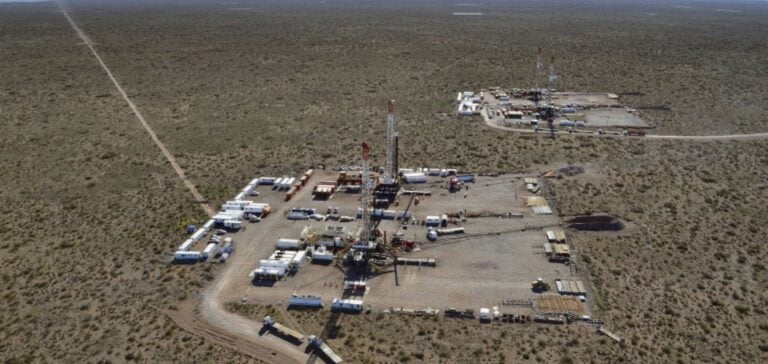Argentina is striving to redefine its role in the South American energy market by increasing its natural gas exports from Vaca Muerta, one of the region’s largest shale reserves.
Faced with a significant drop in Bolivian gas exports to Brazil, Argentina sees a strategic opportunity to meet this growing demand by developing its infrastructure and increasing production.
The recent commissioning of new pipeline projects, such as the Néstor Kirchner, is central to this strategy.
The province of Neuquén, where Vaca Muerta is located, currently produces around 110 million cubic meters of gas per day, much of which is destined for the domestic market.
The country’s total gas production reached 150 million cubic meters per day in 2023, exceeding domestic consumption levels of around 140 million cubic meters per day.
The Argentine government and local companies are exploiting this production surplus to increase gas exports to neighboring markets, particularly Brazil and Chile, via existing and newly developed pipelines.
Infrastructure and Transport Capacities
One of the main levers for increasing exports lies in the expansion and modernization of transport infrastructures.
The recently commissioned Néstor Kirchner pipeline transports 22 million cubic meters of gas per day from Vaca Muerta to the province of Buenos Aires.
At the same time, a gas flow reversal project on another pipeline linking Buenos Aires to northern Argentina is due for completion in October, enabling new exports to Brazil via existing pipelines dating back to the 1990s.
These developments should enable Argentina to completely halt its gas imports from Bolivia and gradually increase its exports to Brazil and Chile.
In response to market changes, Pan American Energy and Tecpetrol, two of Vaca Muerta’s leading gas producers, plan to maximize the use of these new transport capacities to expand their presence in regional markets.
Vaca Muerta Production Potential
Vaca Muerta represents considerable potential for Argentina.
With around 300 trillion cubic feet of recoverable resources, this shale formation is one of the largest in the world and provides Argentina with a solid base for increasing its natural gas exports.
By 2023, around 90% of Neuquén province’s gas production will come from Vaca Muerta and a few other tight gas formations.
Estimates from the province of Neuquén suggest that production could reach 180 million cubic meters per day by 2030 and 270 million by 2031, thanks to projects such as the LNG export terminal, which could reach a capacity of 120 million cubic meters per day.
These forecasts are based not only on the continued increase in shale production, but also on the optimization of existing and future infrastructure capacities.
Repositioning in the Regional Market
The decline in Bolivian gas exports, from 25 million to 14 million cubic meters per day in recent years, creates an immediate opportunity for Argentina.
With an additional export capacity of 5 million cubic meters per day in the short term, Argentine companies are looking to capture a share of the Brazilian energy market, traditionally dominated by Bolivia.
For Chile, which historically imported gas from Argentina until exports were reduced to zero in the 2010s, prospects are also improving.
By 2023, gas exports to the region have recovered to around 4 million cubic meters per day, a figure that is set to rise as new pipeline projects come on stream.
Future prospects and challenges
Argentina will have to navigate several challenges to achieve its export growth targets.
Volatile global gas markets, infrastructure constraints and competition with other regional and global producers will pose obstacles.
However, by strengthening its transportation capacities and increasing its shale gas production, Argentina is positioning itself to become a key supplier of natural gas to the regional market.
Future decisions on infrastructure investment and long-term trade agreements with neighboring countries will be crucial.
These agreements could not only stabilize Argentina’s revenue stream, but also strengthen its position as a key player in South America’s energy sector.






















